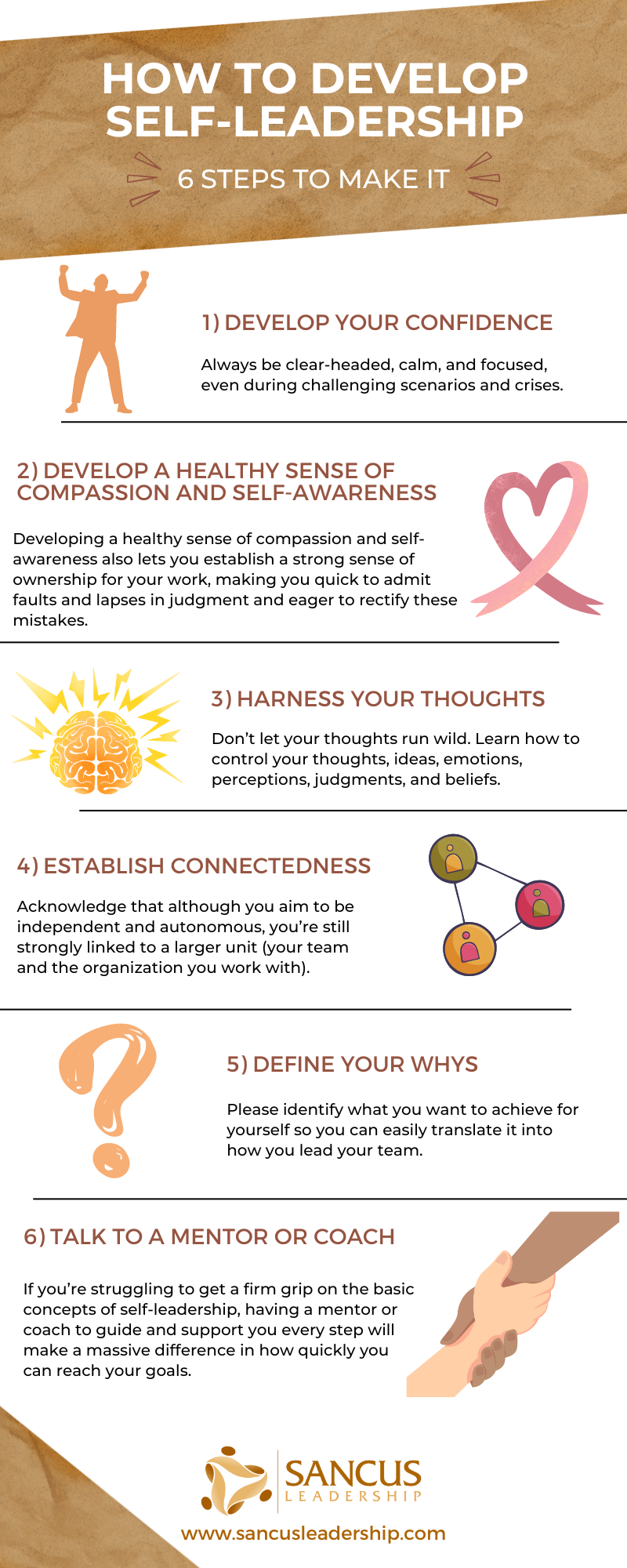Your cart is currently empty!

Can Self-Leadership Truly Be Learned?
Do you feel like you’re good at leading and influencing other people but secretly struggling with managing your thoughts and actions and reining yourself? And you might frequently ask yourself, “Am I fit to be a leader when I wasn’t born with leadership skills? If so, you could be among the many leaders grappling with self-leadership! ” Fret not because self-leadership can be developed over time.
Self-leadership can be learned, provided you’re intentional and patient with yourself. The first step is to develop self-confidence and self-awareness, both crucial aspects of successful self-regulation. Remember, the end goal is to be an effective role model that others will be inspired to emulate.
Stick around to find out why self-leadership is crucial in business and what can happen if you don’t strive to possess this vital skill. You will also come across some tips on beginning your journey toward effective self-leadership, particularly on how to work toward a better understanding and acceptance of your limitations. Let’s begin!
Is Self-Leadership a Natural Skill?

Self-leadership is only sometimes a hardwired skill that people are born with and which sets natural-born leaders apart from the rest of the pack. It is a skill that can be learned and developed over time. It takes a lot of effort, patience, and determination to master the art of self-leadership.
It involves managing and controlling your thoughts and actions with minimal to no outside influence. You push yourself to move forward, reward yourself for big and small wins, make decisions, and arrive at sound solutions to various problems.
Self-leadership is not necessarily essential in effectively managing a team, but it is a skill that will significantly boost your leadership skills. It would be highly advantageous for you to learn how to handle yourself before attempting to manage a team expertly.
Self-leadership is not necessarily essential in effectively managing a team, but it is a skill that will significantly boost your leadership skills.
What Happens When You Don’t Possess Self-Leadership Skills

Self-leadership is a concept that has been introduced previously. Even the best traditional leaders possess this crucial skill because it is a way through which they can better command the respect and compliance of their team. Without it, leaders will have a more challenging time functioning in their roles in the business.
Here’s what can happen when you don’t have solid self-leadership abilities:
- Low employability. The lack of self-leadership will clearly show in your leadership style. Statistics show that in 2019, 77% of companies experienced leadership gaps in their hiring process since they sought individuals with strong leadership skills to join their teams.
- Poor job satisfaction. Not being able to control your thoughts, emotions, and actions will leave you constantly stressed and burned out.
- Low team engagement. Employees can differentiate influential, confident leaders from those who seem unsure.
- High employee turnover. Employees who feel disillusioned, disappointed, and frustrated with their leaders will seek better opportunities elsewhere.
| Effect of no solid self-leadership abilities | Description |
| Low employability | The lack of self-leadership will clearly show in your leadership style. Statistics show that in 2019, 77% of companies experienced leadership gaps in their hiring process since they sought individuals with strong leadership skills to join their teams. |
| Poor job satisfaction | Not being able to control your thoughts, emotions, and actions will leave you constantly stressed and burned out. |
| Low team engagement | Employees can differentiate influential, confident leaders from those who seem unsure. |
| High employee turnover. | Employees who feel disillusioned, disappointed, and frustrated with their leaders will look for better opportunities elsewhere. |
What You Can Gain from Learning Self-Leadership

Learning self-leadership can open up new avenues and opportunities for you. It can also help make you a more effective leader, especially since the ability to self-direct enables you to walk the talk and become a person worth emulating.
Mastering this crucial skill triggers these benefits:
- You learn how to react to various scenarios efficiently.
- You know how to be an independent thinker.
- You train yourself to be a doer.
- You’re able to hone your creativity and out-of-the-box thinking.
- You know how to self-regulate.
- You become more resilient, especially when faced with challenges.
- You’ll empower your team to be independent and innovative.
- You’ll inspire your team members to follow your lead.
How To Develop Self-Leadership

Self-leadership is seen as an enabler of successful businesses. It is a crucial skill that can make a significant difference in both your personal and career growth. Strong self-leadership skills will set you apart as a credible, respectable, and influential leader.
Strong self-leadership skills will set you apart as a credible, respectable, and influential leader.

Here are some tips on how to begin your journey toward developing self-leadership skills:
1. Develop Your Confidence
It would help if you learned to trust yourself when drafting plans, making decisions, and formulating strategies. Self-confidence is critical to successful self-leadership because if you lack this vital virtue, you risk struggling to direct yourself toward progress and success.
Always be clear-headed, calm, and focused, even during challenging scenarios and crises. Remaining collected and practicing allows you to assess strategies to develop the best solutions to dilemmas logically. You’ll be able to keep your head above water even when others around you succumb to anxiety, stress, and failure.
2. Develop a Healthy Sense of Compassion and Self-Awareness
Compassion for yourself and your team members allows you to take stock of your strengths and weaknesses so you can acknowledge and accept that everyone has limitations. Being aware of these can help you become more realistic and grounded about your capabilities.
Developing a healthy sense of compassion and self-awareness also lets you establish a strong sense of ownership for your work, making you quick to admit faults and lapses in judgment and eager to rectify these mistakes.
Self-awareness also gives rise to better self-regulation and higher emotional intelligence. People possessing these skills are honest, adaptable, and realistically hopeful, allowing them to achieve set goals more efficiently.
3. Harness Your Thoughts
Don’t let your thoughts run wild. Learn how to control your thoughts, ideas, emotions, perceptions, judgments, and beliefs. Self-talk is healthy, but only when it is constructive and productive.
Don’t let your thoughts run wild. Learn how to control your thoughts, ideas, emotions, perceptions, judgments, and beliefs.
Self-talk also has a way of reflecting on your image, attitude, and actions. Your subconscious has a surprisingly strong influence over your outlook. Negative self-talk hurts your ability to handle stress, challenges, and failures.
Learn how to self-regulate and strive to convert negative thoughts into affirmative convictions. Utilize them to push yourself toward improvement better and successfully master the art of self-leadership. Remember, if you can’t control yourself, you’ll find leading and managing others extremely challenging.
4. Establish Connectedness
Acknowledge that although you aim to be independent and autonomous, you’re still strongly linked to a larger unit (your team and the organization you work with). Remember, when all is said and done concerning learning self-leadership, you must work harmoniously and synergistically with your team.
5. Define Your Whys
As a leader, you must know that your team looks up to you as a role model. You must demonstrate the skills, behaviors, and attitudes you expect others to adopt.
Please identify what you want to achieve for yourself so you can easily translate it into how you lead your team. Self-leadership isn’t simply about managing yourself — think of it as a gateway to setting your team up for success by being a great role model for them. Being conscious of why you’re striving to master self-leadership will help make the journey more purposeful and give you a sense of fulfillment when you succeed.
6. Talk to a Mentor or Coach
If you’re struggling to get a firm grip on the basic concepts of self-leadership, having a mentor or coach to guide and support you every step will make a massive difference in how quickly you can reach your goals.
At Sancus Leadership, we acknowledge and promote the value of self-leadership. Book a call with us now to discuss how we can help you achieve your full leadership potential!
Leadership and Management expert Lolly Daskal, in this TED talk, explains how to empower and lead others effectively by first nurturing leadership from within yourself.
Final Thoughts
Leaders who don’t possess strong self-leadership abilities are at risk of being ineffective in their roles in the team. When your team members see that you’re struggling with managing your thoughts, emotions, and outlook, they’ll feel disinclined to respect and honor your leadership brand. The good news is that self-leadership can be developed over time.
Self-awareness and self-regulation are vital aspects involved in learning self-leadership. These crucial skills allow you to become a more realistic, practical leader and will enable you to become more intentional and pragmatic with the way you handle your team.
